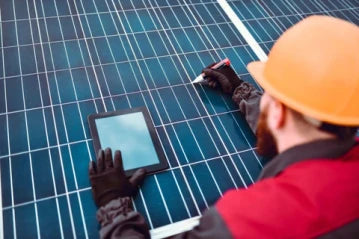
As the popularity of solar energy continues to rise, many individuals are considering harnessing the power of the sun to charge their 48V batteries. However, determining the appropriate size of solar panel required for efficient charging can be a daunting task. In this article, we will delve into the factors to consider when choosing a solar panel size for your 48V battery charging needs.
We will explore important aspects such as the number of solar panels required, increasing solar panel voltage, charging time for a 48V battery, compatibility with 48V 200AH batteries, and the feasibility of using 12V solar panels for charging. By understanding these key points, you can make an informed decision and maximize the effectiveness of your solar power setup.
Determining the Number of Solar Panels
To determine the number of solar panels needed to charge a 48V battery, a useful guideline involves dividing the battery's watt-hour capacity by the average daily hours of sunshine, and then dividing that result by the wattage of each solar panel. Let's consider an example using a 3.6 kWh (kilowatt-hour) lithium-ion battery with an average of 6 hours of daily sunshine.
With the conversion of 3.6 kWh to 3600 watt-hours, we divide this value by 6 hours, resulting in 600 watts. Therefore, your solar panels must generate a total of 600 watts to charge the 48V battery efficiently. If you plan on installing 200-watt panels, a simple calculation of 600/200 reveals that you would need a minimum of three 200-watt panels to charge your 48V battery effectively.
How to Increase Solar Panel Voltage?
Increasing the solar panel voltage can be advantageous when charging higher-voltage batteries. One approach to achieve this is by connecting multiple solar panels in series. This series connection adds up the voltages of individual panels, resulting in an overall higher voltage output. By ensuring the compatibility of the solar panels and the charging system, this method can optimize the charging efficiency of your 48V battery.
How Long Does It Take to Charge a 48V Battery?
The charging time for a 48V battery depends on various factors such as battery capacity, solar panel wattage, available sunlight, and charging efficiency. While a general rule of thumb is to estimate charging time by dividing the battery's capacity by the charging current, it's essential to consider real-world conditions. Factors like weather conditions, shading, and other environmental influences can affect charging time. Consulting the battery manufacturer's specifications and seeking professional advice can provide more accurate estimates for your specific setup.
How many solar panels do I need to charge a 48v 200AH battery?
If you have a 48V 200AH battery, determining the number of solar panels required for efficient charging follows a similar calculation process. Divide the battery's watt-hour capacity (in this case, 48V x 200AH) by the average daily hours of sunshine and then divide that result by the wattage of each solar panel. This calculation will provide you with an estimate of the number of solar panels needed to effectively charge your 48V 200AH battery.
Can you charge a 48v battery with a 12v solar panel?
It is not recommended to charge a 48V battery directly with a 12V solar panel. For optimal and safe charging, the voltage output of the solar panel should match the battery's voltage. Attempting to charge a higher-voltage battery with a lower-voltage solar panel may not provide sufficient power and can potentially damage either the battery or the solar panel. To ensure optimal performance and longevity of your solar power system, it is essential to use solar panels with compatible voltage ratings.
Conclusion
Choosing the right size of solar panel is crucial for efficiently charging a 48V battery. By considering factors such as the number of solar panels needed, increasing solar panel voltage, charging time, battery capacity, and compatibility with 48V 200AH batteries, you can make an informed decision for your solar power setup. Remember to consult professionals, refer to manufacturer guidelines, and assess your specific requirements to ensure the best results. Investing in the correct solar panel size will enable you to harness the sun's energy effectively, providing clean and renewable power to charge your 48V battery with confidence.
ECGSOLAX offers high quality deep cycle batteries in 24v 100AH, 48v 200AH etc. If you are interested in our products, please contact us and learn more!

0 Kommentare